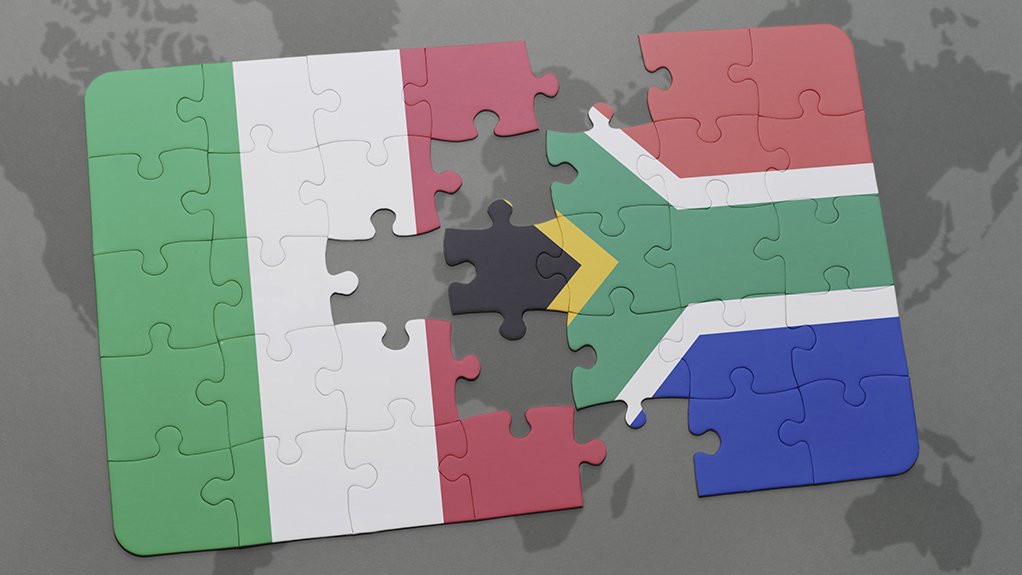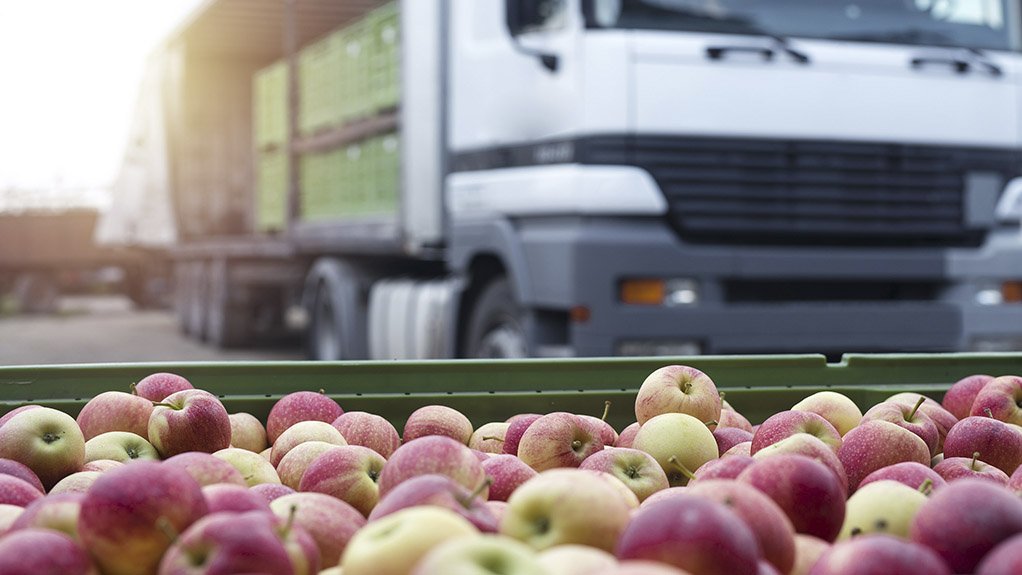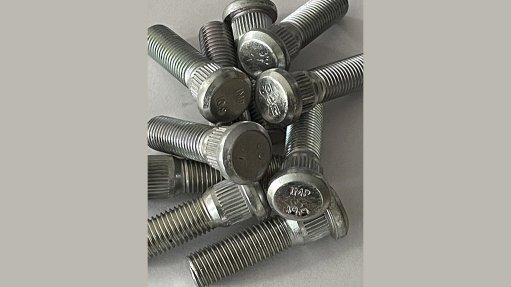Increased presence for Italian business in S Africa next year




POSITIVE OUTLOOK The trade situation between South Africa and Italy is looking far more positive for the year ahead
Photo by Adobe
PAMINA BOHRER Italian firms are keen to partner with South African companies and are prepared to actively invest in skills transfer
TRADING FOOD PRODUCTS Food products, such as seafood, fruit and nuts were a significant part of the trade between South Africa and Italy over the past year
Photo by Adobe
The Italian-South African Chamber of Trade and Industry (Italcham) aims to continue improving its presence in South Africa next year.
“We intend to establish an antenna in Cape Town and, possibly, even in Durban and Gqeberha. This means managing multiple hubs with a higher number of events nationally,” Italcham secretary general Pamina Bohrer tells Engineering News.
This comes on the back of trade recovering after the negative consequences of the Covid-19 outbreak last year.
Bohrer says the second quarter of this year was the highest dollar-value trade-quarter – $681-million – since the first quarter of 2018, with mechanical and electrical machinery, mineral fuels, vehicles and pharmaceuticals products being the primary products.
Similarly, the highest value of goods were exported from South Africa to Italy – totalling $281-million and $269-million in the first and second quarters respectively.
“This puts South Africa on track to record over $1-billion of exports to Italy – a figure that wasn’t achieved in either 2019 or 2020. Of course, the high commodity prices also had an impact on the absolute values,” she says.
Products which accounted for the bulk of this trade were metals, such as ore, steel and nickel; food products, such as seafood, fruit and nuts; and luxury items, such as yachts.
Trade between South Africa and Italy was negatively affected after the outbreak last year. The demand for imported goods decreased, with Italy’s trade to South Africa decreasing by 21% in 2020, when compared with that of 2019.
South Africa’s exports to Italy also took a knock last year, decreasing by 11.6% from 2019. Considerable delays at South African ports further exacerbated the problem.
However, Bohrer believes that the situation is looking far more positive for the year ahead.
Areas of Interest
The renewables market is attracting strong foreign direct investment (FDI) flows from Italy into South Africa.
“The renewables sector has shown positive FDI from previous bid windows from Italian energy companies such as Enel Green Power, Ansaldo Energia and Enertronica Santerno. After five long years, the investment climate for this sector seems to be returning to being very promising,” states Bohrer.
She adds that the recently implemented Renewable Energy Independent Power Producer Procurement Programme has enjoyed revitalised Italian participation.
Moreover, the United Nations’ COP26 funding announcement is also positive, Bohrer notes. The R129-billion grants package, announced at COP26 last month, is designed to accelerate a transition away from coal power towards renewable alternatives.
South Africa and other developing countries are set to benefit significantly from this programme, as most developing countries cannot afford the current costs involved in transitioning.
Manufacturing machinery remains promising, especially if tangible progress on the proposed sector masterplans is achieved.
Additionally, opportunities in the environment, social and governance investment space are growing.
“There is a lot of talk about the circular economy, but the South African market has not yet reached the level of maturity that we see in Europe. However, emission-reducing technology is an opportunity where local legislation has changed and is being enforced, requiring South African companies to invest more in this area,” Bohrer explains.
Opportunities are also blossoming in the fledgling Industry 4.0 technology arena.
“Industry 4.0 opportunities are still fairly new, but the use of manufacturing blueprints for three-dimensional printing from Italy is starting to take hold in the South African manufacturing sector,” she notes.
The Role of SMEs
“Growth in small and medium-sized enterprises (SMEs) and their competitiveness can go a long way towards creating jobs in South Africa. Italian firms are generally keen to partner with local companies, and are also prepared to actively invest in skills transfer,” Bohrer says.
She notes that Italy has specific machineries and business models for SMEs, which help to improve productivity. She believes that this will help to facilitate increased production and beneficiation, and distribute economic activity more evenly.
“South Africa’s goal is to provide more value-add to raw material and agricultural products before they are exported. Italy has the tools and expertise to help make this a reality. It’s a win-win.”
Bohrer notes, however, that policy uncertainty, structural reforms, exchange rate volatility, visa regulations and skills shortages are of concern to Italian investors, with broad-based black economic-empowerment (BBBEE) compliance particularly challenging for European businesses.
“SME’s typically have limited specialised knowledge on how to tackle the BBBEE scorecard. Moreover, sometimes there is limited funding available to design and implement compliant programmes that can result in a favourable BBBEE score”.
Bohrer adds that the continuous monitoring and evaluation required for successful BBBEE compliance is time consuming and requires a thorough understanding of the legislation.
The Italcham has developed a BBBEE trust, which is aimed at assisting Italian SMEs in achieving compliance.
The Chamber has also built a network of specialised consultants in high opportunity sectors, such as renewable energy, engineering and healthcare, to assist Italian SMEs with market entry and business development on a contract basis.
Article Enquiry
Email Article
Save Article
Feedback
To advertise email advertising@creamermedia.co.za or click here
Press Office
Announcements
What's On
Subscribe to improve your user experience...
Option 1 (equivalent of R125 a month):
Receive a weekly copy of Creamer Media's Engineering News & Mining Weekly magazine
(print copy for those in South Africa and e-magazine for those outside of South Africa)
Receive daily email newsletters
Access to full search results
Access archive of magazine back copies
Access to Projects in Progress
Access to ONE Research Report of your choice in PDF format
Option 2 (equivalent of R375 a month):
All benefits from Option 1
PLUS
Access to Creamer Media's Research Channel Africa for ALL Research Reports, in PDF format, on various industrial and mining sectors
including Electricity; Water; Energy Transition; Hydrogen; Roads, Rail and Ports; Coal; Gold; Platinum; Battery Metals; etc.
Already a subscriber?
Forgotten your password?
Receive weekly copy of Creamer Media's Engineering News & Mining Weekly magazine (print copy for those in South Africa and e-magazine for those outside of South Africa)
➕
Recieve daily email newsletters
➕
Access to full search results
➕
Access archive of magazine back copies
➕
Access to Projects in Progress
➕
Access to ONE Research Report of your choice in PDF format
RESEARCH CHANNEL AFRICA
R4500 (equivalent of R375 a month)
SUBSCRIBEAll benefits from Option 1
➕
Access to Creamer Media's Research Channel Africa for ALL Research Reports on various industrial and mining sectors, in PDF format, including on:
Electricity
➕
Water
➕
Energy Transition
➕
Hydrogen
➕
Roads, Rail and Ports
➕
Coal
➕
Gold
➕
Platinum
➕
Battery Metals
➕
etc.
Receive all benefits from Option 1 or Option 2 delivered to numerous people at your company
➕
Multiple User names and Passwords for simultaneous log-ins
➕
Intranet integration access to all in your organisation




















